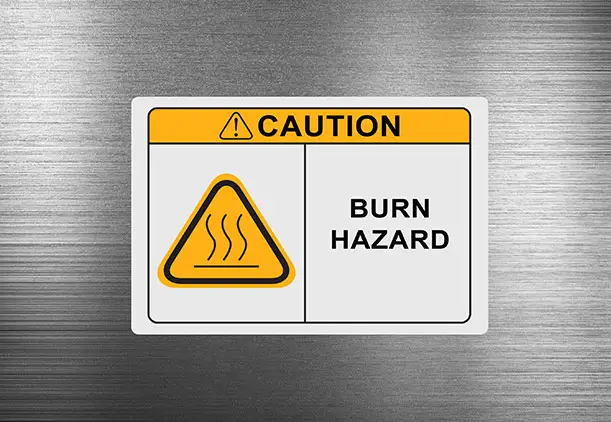This article follows on from our previous piece, which looked at ‘blockout’, ‘piggyback’ and ‘integrated’ labels. This time we’re looking at ‘heat resistant’ labels.
In the article, we will use our in-depth understanding of all things related to labels to explain how they work, the advantages of their use and types of application.
Heat resistant label materials
Heat resistant label materials are designed to withstand high temperatures without melting, degrading or falling off. These materials are found in applications where labelling is coming into contact with high temperatures or used in hot environments.
Typical industries with requirements for high temperature labels are automotive, aerospace and industrial manufacturing.
Common heat-resistant label materials
Polyester labels
Polyester is a synthetic polymer and is exceptionally durable and can withstand temperatures of up to 150°C. It is resistant to chemicals, abrasion and moisture, making it ideal for use in harsh environments. They can maintain their appearance over a long period of time.
Polyester labels can be printed using a variety of printing techniques, including thermal transfer printing, laser printing, and inkjet printing.
Polyimide labels
Resistant to high temperatures of up to 300°C, polyimide labels are commonly used in applications where extreme heat resistance is required, such as in the electronics industry.
Polyimide labels are typically produced using a thermal transfer printing process, which uses a heated print head to transfer ink from a ribbon onto the label material. This produces a high-quality, durable label that can withstand extreme conditions.
Silicone labels
Silicone labels are extremely durable and flexible, they can withstand temperatures of up to 200°C and are resistant to water and chemicals. They are often used in automotive and industrial applications where flexibility and heat resistance are required.
Silicone labels have become popular due to their longevity, flexibility, and non-toxic nature. They are also easy to clean and maintain.
Ceramic labels
Ceramic labels are labels made from ceramic materials, such as porcelain or stoneware, that are designed to be durable and long-lasting. They are extremely durable withstanding temperatures of up to 1200°C and corrosive chemicals, without losing their legibility or integrity. They are commonly used in harsh environments such as in furnaces and ovens.
Ceramic labels are typically made through a process of firing and glazing, which creates a hard, durable surface that is resistant to fading, scratching and weathering. They can be customised with a variety of colours and designs, making them a popular choice for branding and identification purposes.
Aluminium labels
Aluminium labels offer high durability, they are water resistant and can withstand temperatures of up to 600°C. These are commonly used in industrial environments where high-temperature resistance is required.
Aluminium labels can be printed or engraved with text, graphics, barcodes and other information using a variety of techniques, including screen printing, digital printing and laser engraving. Labels can be customised to meet specific requirements, such as size, shape, colour and adhesive type and can be applied to various surfaces including metal, plastic, and wood.
Some common uses of aluminium labels include asset tagging, inventory tracking, product identification, warning labels, safety labels, and branding labels. They are also widely used in the aerospace and automotive industries for identification and traceability of parts and components.
Choosing the right type of label
When determining which heat-resistant label material to adopt for your application, it is important to consider the specific application, environment and temperature range. Some labels may also require additional features such as chemical resistance, UV resistance or special adhesive to work on specific surfaces.
If you require labels for your business and need help selecting the most suitable type of label for your needs. Get in touch and one of our specialist team will guide you through the options and help you source it for the right price.
